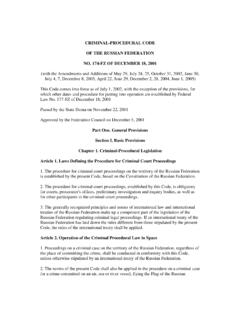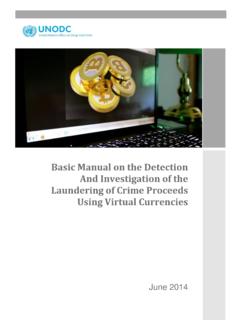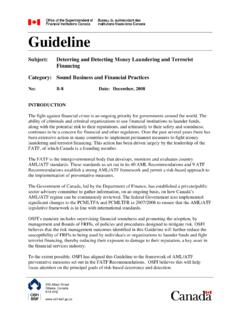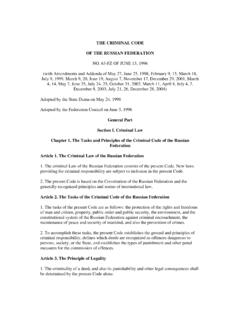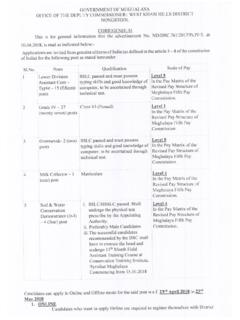Transcription of GPML s TRAINING COURSE ON MONEY TRANSFER SERVICES …
1 GPML's TRAINING COURSE ON MONEY TRANSFER . SERVICES : I. Background and Rationale MONEY remittances generate huge MONEY flows. According to the World Bank, MONEY remittances have reached around $600 billion annually1. The MONEY remittance sector plays an important role in the economic development of countries. It facilitates the financial inclusion of people and has a direct impact on the monetary policies of countries. There is a long list of factors which impact and cause differences in MONEY TRANSFER SERVICES (MTS): geography, the level of economic and technological development of a country, its regulatory and legal regimes, the access to (or lack of) formal financial sector SERVICES in a country, the traditional and cultural preferences of customers, and so on. These factors need to be thoroughly understood in order to address the MONEY laundering and terrorist financing risks to which the MTS sector is exposed.
2 Only then is it possible to develop and implement sound supervisory, preventative and investigative measures. II. Scope According to the FATF, MONEY or value TRANSFER SERVICES (MVTS) refers to financial SERVICES that involve the acceptance of cash, cheques, other monetary instruments or other stores of value and the payment of a corresponding sum in cash or other form to a beneficiary by means of a communication, message, TRANSFER , or through a clearing network to which the MVTS. provider belongs. Transactions performed by such SERVICES can involve one or more intermediaries and a final payment to a third party, and may include any new payment methods. Sometimes these SERVICES have ties to particular geographic regions and are described using a variety of specific terms, including hawala, hundi, and fei-chen 2 . These SERVICES are often referred to as alternative remittance systems since they function beyond the formal financial sector, and as such, they are not the subject of this TRAINING COURSE .
3 The current TRAINING COURSE will target the traditional regulated MONEY TRANSFER sector which is a part of the formal financial and banking industry, and thus, can be researched, assessed, and understood with a greater level of detail and accuracy. III. Outcomes This TRAINING COURSE will increase the trainees' awareness and understanding of: 1. for-second-consecutive-year 2. Glossary to the FATF Recommendations; 1. (i) variety of MTS and MTS providers;. (ii) misuse of MONEY TRANSFER SERVICES for ML/TF purposes;. (iii) ML/TF risks associated with MTS;. (iv) criminal transaction patterns common for MTS;. (v) specific red flags ;. (vi) identification of suspicious activities associated with MTS;. (vii) strengthening cooperation and information exchange between MTS providers, financial regulators, FIU and law enforcement authorities. IV. Target audience and the trainee profile requirements The TRAINING COURSE will be beneficial for: MTS providers' compliance officers and front line associates.
4 Regulatory and supervisory authorities over MTS providers;. Financial Intelligence Units;. law enforcement officers charged with (financial) investigations. V. TRAINING arrangements The TRAINING COURSE is country specific. A preliminary needs assessment will be conducted by the GPML prior to the TRAINING delivery. Upon nomination by the respective agencies, each participant will be asked to answer (through the on-line questionnaire) the questions that will help the GPML to customize the TRAINING COURSE to the county legal and regulatory environment and the needs of the target audience. The TRAINING COURSE is a two-four-day workshop (depending on the target audience) and includes mini-lectures, plenary discussions and practical exercises. The maximum number of participants should be between 24-30 persons. VI. List of modules 1. Overview of MONEY TRANSFER SERVICES 2.
5 Inherent risks and vulnerabilities 3. Variety of MTS providers 4. AML/CFT compliance controls 5. Specifics of KYC/CDD. 6. AML/CFT & Anti-Fraud measures: good practices and recommendations 7. Information available to MTS providers 8. Compliance cooperation between MTS providers 9. MTS providers' cooperation with FIU, LEAs and regulatory authorities 2.
